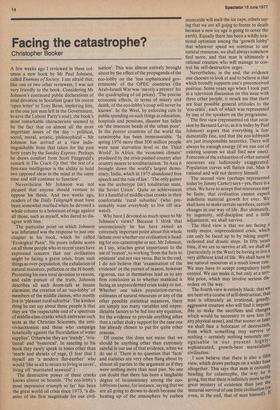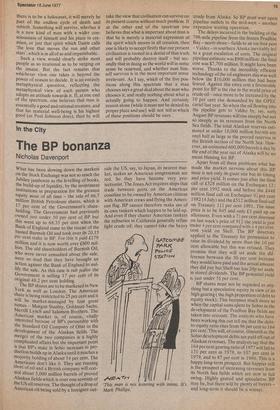Facing the catastrophe?
Christopher Booker
A few weeks ago I reviewed in these columns a new book by Mr Paul Johnson, called Enemies of Society. I am afraid that, like one or two other reviewers, I was not very friendly to the book. Considering Mr Johnson's continued public declarations of total devotion to Socialism (pace his recent 'open letter' to Tony Benn, imploring him, as the one just man left in the Government, to save the Labour Party's soul), the book's most remarkable characteristic seemed to be the fact that on almost all the most important issues of the day — political, social, moral, artistic, philosophical — Mr Johnson has arrived at a view indistinguishable from that taken for the past forty years by the Sunday Express. Perhaps he draws comfort from Scott Fitzgerald's remark in The Crack-Up that 'the test of a first-rate intelligence is the ability to hold two opposed ideas in the mind at the same time and still continue to function'.
Nevertheless Mr Johnson was not pleased that anyone should venture to oppose his thesis. And two weeks ago, readers of the Daily Telegraph must have been somewhat startled when he devoted a whole column to a holocaust of rage against all those, such as myself, who dared to disagree with him.
The particular point on which Johnson was infuriated was the response to just one chapter in his book, which he called 'Ecological Panic'. He pours infinite scorn on all those people who in recent years have expressed concern that our civilisation might be facing a grave crisis, from such things as over-population, the exhabstion of natural resources, pollution or the H-bomb. Protesting his own total devotion to reason, and calm pursuit of the truth, Johnson describes all such doom-talk as insane alarmism, the creation of an 'eco-lobby' of members of the middle classes, who mostly live in 'pleasant rural suburbia'. The kindest thing he can say about these people is that they are 'the respectable end of a spectrum of middle-class cranks which embraces such sects as the Christian Scientists, the antivivisectionists and those who campaign fanatically against the fluoridation of water supplies'. Otherwise they are 'trendy', 'irrational' and 'hysterical'. In reacting to his book they rarely speak in tones other than 'snarls and shrieks of ,rage, (I fear that I myself am 'a modern flat-earther' who would 'like us all to return to living in caves', living off 'marinated seaweed'.)
The destructive power of these cranks knows almost no bounds. 'The eco-lobby's most impressive triumph so far' has been the great world oil crisis since 1973, 'a disaster of the first magnitude for our civil isation'. This was almost entirely brought about by the effect of the propaganda of the eco-lobby on the 'less sophisticated governments' of the OPEC countries (the Arab-Israeli War was 'merely a pretext' for the quadrupling of oil prices). The precise economic effects, in terms of misery and death, of the eco-lobby's coup will never be known'. In the West, by enforcing cuts in public spending on such things as education, hospitals and pensions, disaster has fallen on 'the innocent heads of the urban poor'. In the poorer countries of the world the catastrophe has been immeasurable. 'In spring 1976 more than 500 million people were near starvation level in the Third World'. In Africa, the 'economic climate' produced by the crisis pushed country after country nearer to totalitarianism. 'In Asia it brought down the world's largest democracy, India, which in 1975 abandoned free speech and the rule of law'. 'The only gainer was the archetype (sic) totalitarian state, the Soviet Union'. Quite an achievement for a handful of middle-class cranks in their comfortable 'rural suburbia' (who presumably want everybody to live off seaweed).
Why have I devoted so much space to Mr Johnson's views? Because I think that unconsciously he has here raised an extremely important point about this whole debate over whether our civilisation is heading for eco-catastrophe or not. Mr Johnson, as I say, attaches great importance to the use of 'reason', to working 'from the facts to opinions' and not vice versa. But in the end, I do not believe that 'examination of the evidence' or the pursuit of reason, however rigorous, can in themselves lead us to any firm conclusion as to whether mankind is facing an unprecedented crisis today or not. Whether one takes population-curves, estimates of natural resources or any of the other possible statistical measures, there are simply too many variables and unpredictable factors to be fed into any equation, for the evidence to provide anything other than a rather shaky support for the case one has already chosen to put for quite other reasons.
Of course this does not mean that we should be anything other than extremely careful in our use of that evidence, when we do use it. There is no question that 'facts' and statistics are very often flung about by almost all parties to the argument as if they were nothing more than mud pies. No one can doubt that there has been a laughable degree of inconsistency among the ecolobbyists (some, for instance, saying that we are all going to drown to death because the heating up of the atmosphere by carbon monoxide will melt the ice caps, others say ing that we are all goipg to freeze to death because a new ice age is going to cover the earth). Equally there has been a wildly irra tional optimism among the 'growth lobby' that whatever speed we continue to use natural resources, we shall always somehow find more, and that man is ultimately a rational creature who will manage to control his self-destructive urges.
Nevertheless, in the end, the evidence one chooses to look at and to believe is that which broadly supports one's preconceived position. Some years ago when I took part in a television discussion on this issue with three other people, it struck me that there are four possible general attitudes to the `eco-crisis', each of which was represented by one of the speakers on the programme.
The first view (represented on that occasion by Bernard Levin, as it is today by Paul Johnson) argues that everything is fundamentally fine, and that the eco-lobbyists are just irresponsible neurotics. There will always be enough energy (if we run out of existing sources we shall find new ones). Forecasts of the exhaustion of other natural resources are ludicrously exaggerated. Population curves will flatten out. Man is rational and will not destroy himself.
The second view (perhaps represented today by Jimmy Carter) says — yes, there is a crisis. We have to accept that resources may be finite, that civilisation cannot expect indefinite material growth for ever. We shall have to make certain sacrifices, certain changes in our way of life. But ultimately, by ingenuity, self-discipline and a little adjustment, we shall survive. The third view is that we are facing a really major, unprecedented crisis, which can only be faced up to by taking unprecedented and drastic steps. In fifty years time, if we are to survive at all, we shall all (particularly in the West) be having to live a very different kind of life. We shall have to use natural resources at a much lower rate. We may have to accept compulsory birth control. We can make it, but only at a terrible price, which may involve serious disorders on the way.
The fourth view is entirely black: that we are bent on a course of self-destruction, that man is ultimately an irrational, greedy, aggressive creature who will find it impossible to make the sacrifices and changes which would be necessary to save him (in any physical sense), and that sooner or later we shall face a holocaust of destruction, from which something may survive or nothing — certainly nothing remotely recognisable in our present highly sophisticated, growth-bent materialistic civilisation.
I now believe that there is also a fifth view, which draws perhaps on a wider base altogether. This says that man is certainlY heading for catastrophe, the way he is going, but that there is'infinitely more to the great mystery of existence than just the material survival of one little civilisation Of, even, in the end, that of man himself). II there is to be a holocaust, it will merely be part of the endless cycle of death and rebirth. Something will survive, whether it is a new kind of man with a wider consciousness of himself and his place in creation, or just that spirit which Dante calls 'the love that moves the sun and other stars', which is in all of us and imperishable.
Such a view would clearly strike most people as so irrational as to be verging on the insane. But the fact remains that Whichever view one takes is beyond the power of reason to decide. It is an entirely metaphysical question, reflecting the metaphysical view of each person who adopts an attitude towards it. If, at one end of the spectrum, one believes that man is essentially a good and rational creature, and that his material well-being is his highest good (as Paul Johnson does), then he will take the view that civilisation can survive on its present course without much problem. If at the other end of the spectrum one believes that what is important about man is that he is merely a material expression of the spirit which moves in all creation, then one is likely to accept firstly that our present civilisation is rooted in a denial of that truth and will probably destroy itself but secondly that in doing so the world will in some sense be renewed, and whether man himself survives is in the most important sense irrelevant. As I say, which of the five positions along this spectrum that a man chooses says a great deal about the man who chooses it, and really nothing about what is actually going to happen. And certainly reason alone (while it must not be denied its proper place and use) will not tell us which of these positions should be ours.



































 Previous page
Previous page